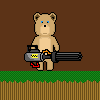There's a few issues being mixed up here, relating to the process by which a design changes over the development lifecycle.
1) Involvement of "non-design" staff.
2) Deviation from the original design.
Neither of these have anything to do with the premise of the thread -- which is the value of an
initial idea, these tangents are about the way in which ideas are evolved.
To address the second one first, let's pretend for a moment that none of the other staff ever speak to the designer, and only implement his wishes.
Let's also say that the game project has a 3 month pre-production period, where the initial draft of the GDD is created and the project schedule/budget is decided upon, followed by 18 months of production. We'll also say that everyone is on $80k per anumn, that there is 1 designer and 2 dozen implementers.
The game designer's wages during pre-prodcution, where he's writing the initial GDD come to $20,000.
The game designer's wages during production, where he is revising the GDD and guiding the implementation come to $120,000.
From this we can see that the initial idea is not that valuable, and that most of the expense is in refining the original idea and guiding it's implementation.
The first rule of capitalism is, expenses wouldn't exist unless they are necessary. If the initial game design was the most valuable part, and didn't need to be refined, then businesses would save $120,000 by not keeping the designer around for the production phase of the project. In reality, the most important work done by the designer occurs in the production phase, and his pre-production work is not actually that important in the grand scheme of things.
This part is off-topic, but to put things in perspective, the cost of implementation is $1.44 million... if a good implementation wasn't important, then businesses would hire inexperienced staff for half the price and cut that down to half a mil... but doing so would compromise the value of the game, so they generally don't. Going back to the first part -- you seem to think that because staff from other disciplines have any input into the process at all, then this means that the designer's vision has been compromised, or that the designer does not have the final say on every little thing. This is not true.
You can still have a dictatorial designer, controlling every little aspect of the game and making constant demands of the implementers but the implementers would still have to have creative input.
Again: if the designer's work contains a complete specification of exactly how the computational game state should change from frame-to-frame, then the designer is actually writing code! The designer is not writing code, so there will necessarily be small holes that must be filled by an implementer, which takes creativity on their part to come up with the computations, variables and algorithms that best fit with the designer's vision. The way that these gaps are filled can be reviewed (
i.e. played) by the designer as they are implemented, allowing him to now see his own design with more clarity and make even more specific requests (
such as changes to the way these holes were filled - the algorithms and code can be explained to him, so he can further tweak them).
Going all the way back to the original premise, about the value of an
initial design --
Let's compare game design with architecture for a moment. In architecture, the designer (
architect) draws up plans for a house, hoping to create something
aesthetically pleasing,
functional,
structurally sound, and
inexpensive. All of these goals can be evaluated during pre-production (
before building the house). The designer can create drawings of the house, or model it inside a computer, so see exactly what the final product will be like. Once the blueprints are perfect, then production (construction) can begin, with few or no changes to the initial design.
Video game design cannot work this way.
A game designer draws up plans for a game, hoping to create something interactive that is
fun, or something that delivers a certain
experience.
You cannot write the design for Super Mario Bros. in a word document and then evaluate how fun it is or what the experience is like. To evaluate the design, you need to be able to
play it.For some certain categories of games, a pure designer can prototype parts of the game by himself -- e.g. implementing turn based combat mechanics using cardboard, scissors, pens, etc... -- but for many kinds of games, there is no way that the design can be prototyped outside of a computer.
Due to the fact that the designer cannot evaluate the merit of his designs, this makes his job very different from that of an architect, etc. A game designer literally has no way to design a perfect game in isolation in his
initial draft. Great games
have to evolve over the course of their development. As the first implementations of the game come into existence, the designer is finally granted the ability to evaluate his initial design and make changes to his design as necessary.
It's the inability to evaluate the success of an initial design that makes them nearly worthless. Before you can tell if a design is fun, it
has to be implemented in some form (
whether that's a tabletop prototype or a computer prototype). An initial design is just a sketch, a draft, and
the real hard work done by a real game designer happens during implementation, not during the first draft.
You need artists and nerds to make video games
unfortunately neither artists nor nerds have the right personality for making entertaining video games ...
The people I've worked with in the industry are ridiculously diverse. They've come from Australia, New Zealand, Papua New Guinea, Malaysia, Japan, Taiwan, Hong Kong, Korea, Ireland, England, France, Sweden, Germany, Italy, The Netherlands, Russia, Poland, Iraq, India, Pakistan, Canada, USA, Brazil, Chile, and so many more I've forgotten. They've been trained as classical oil painters or self educated coders, destitute and homeless in foreign lands or married to fine wine reviewers, sneaker enthusiasts or mechanics, electricians or psychologists, they've fought in middle eastern wars or acted as UN peacekeepers, spoken four languages or just one, been reality TV cooks or even meth-amphetamine cooks, been shot and stabbed in bad cities or worldwide surfer dudes, operated bars/pubs or built missile guidance systems, been stuntmen for TV shows or pilots or teachers, and so on... but yeah, I guess they're all just boring nerds with the same bland personality












